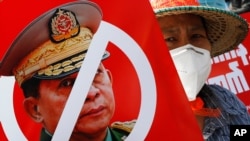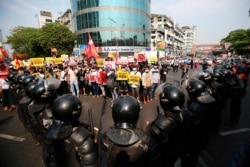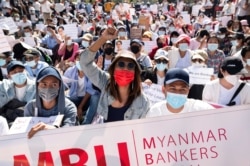As recently as last year, Myanmar was being touted as an attractive destination for international investors, even in the face of bad publicity over the government’s handling of the crisis in Rakhine State, where almost 1 million Rohingya residents had been massacred or driven into exile.
“While potential investors should be wary of inadvertently supporting the persecution, well-placed investments could yield rewards and spur a developing economy,” wrote the website World Finance – which bills itself as “the voice of the market” – in February 2020.
“The raw materials for a thriving investment climate are all present if businesses are willing to enter the market.”
Fourteen months and one military coup later, foreign governments and companies are scrambling to reassess their relationships with the military junta that seized power on February 1 from the democratically elected government led by Aung San Suu Kyi.
Human rights activists have mounted a pressure campaign against international companies seen as propping up the regime in Naypyitaw. In March, Burma Campaign UK published “The Dirty List,” a file detailing the role it claims certain international companies have played in assisting the military.
Especially troubling for many investors are their connections with Myanmar Economic Corporation and Myanmar Economic Holdings Public Company Limited – both controlled by the now-ruling Burmese military or Tatmadaw, which has long relied on business activities to finance its own operations.
The companies provide funds to the military through a range of enterprises, such as banking, mining, tobacco and tourism. MEHL also provides pensions for members of the Tatmadaw.
Some military leaders, along with members of their families, also maintain personal business interests both inside and outside of Myanmar. For example, Aung Pyae Sone, the son of coup leader general Min Aung Hlaing, owns a beach resort and is a major investor in the military-backed telecommunications company Mytel according to a recent BBC report.
The junta enjoys other lucrative sources of funding, including approximately $900 million a year from the oil and gas industry, according to the NGO Publish What You Pay (PWYP).
Total's Chief Executive Patrick Pouyanne recently commented to Bloomberg's James Regan that the company “must continue to produce gas in Myanmar and pay taxes to the military junta to protect staff from forced labor and maintain electricity supplies.”
Nevertheless, Pouyanne said that Total is scrapping plans to develop gas off Myanmar’s west coast and halting its gas well drilling campaign. He said Total would donate the equivalent of the taxes owed to human rights associations.
Singapore-based financial institutions are another major source of investment for Myanmar, with several of them processing transactions for banks linked to Myanmar’s military, according to The Dirty List and Justice for Myanmar.
Justice for Myanmar has identified the Singapore stock exchange as a major source of funding for Golden City, a controversial $50 million development project in Yangon occupied by powerful Chinese multinational corporations. These include CITIC, China Railway Construction Corporation and Bank of China. Tech firm Huawei leases 147 of the 221 luxury apartments.
Golden City routes millions of dollars to the office of the Quartermaster General, the procurement arm of the Myanmar military, and the City is built on military land, according to Justice for Myanmar.
While private companies reassess their entanglements in Myanmar, some Western governments have responded to the coup with sanctions against the two military-controlled companies and a cutoff in other cooperation with the junta. Britain has sanctioned MEHL while the United States has imposed sanctions on both.
However, at least 12 countries continue to provide military assistance or other cooperation to the Myanmar junta, according to a list published by Burma Campaign UK.
International pressure also has been brought in other ways. The United States last month froze about $1 billion, which the Myanmar military was attempting to transfer from the Federal Reserve Bank of New York.
The Asian Development Bank meanwhile has temporarily withdrawn millions of dollars in annual funding for government projects. Between 2013 and 2019 the ADB provided grants and loans to Myanmar worth $2.4 billion.
Japan, for its part, has suspended the provision of new aid to Myanmar, Foreign Minister Toshimitsu Motegi announced on March 30. Japan had been the largest provider of economic assistance at $1.7 billion in fiscal 2019.
Motegi argued this approach would be more effective than imposing sanctions, and it would put more pressure on the military. But the decision may have been influenced by Japan’s strong economic and military ties to Myanmar, which is an operational home to about 450 Japanese companies.


